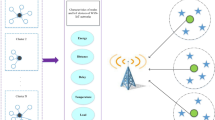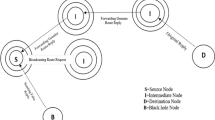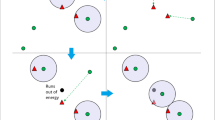Abstract
In cooperative Mobile Ad-hoc Networks (MANETs), copies of data are replicated on different mobile devices to improve system’s availability. A primary or authoritative control node is assigned to act as a coordinator for the shared data copies, when this primary fails, another node has to be elected to replace the failed one. Since mobile devices have a limited battery power, the primary may fail at any time. Moreover, current primary election protocols in MANETs employ a notable wireless communication overhead which consumes a considerable amount of battery power. In this paper, we propose a novel protocol, called Primary Replacement Protocol (PRP), to replace an exhausted primary in MANETs based on the measurement of its remaining battery power early before it dies. More specifically, PRP replaces the exhausted primary with a healthy node when its remaining battery power reaches a predefined threshold. This replacement can be accomplished with much less communication overhead. Hence, our approach has two contributions: 1) reducing the chance of primary outage by early detection of potential power failure, 2) saving the power that is consumed in traditional primary election approaches due to communication overhead.




Similar content being viewed by others
References
Derhab A, Badache N (2008) A self-stabilizing primary election algorithm in highly dynamic ad hoc mobile networks. IEEE Trans Parallel Distrib Syst 19(7):926–939
Dijkstra EW, Scholten CS (1980) Termination detection for diffusing computations. Inf Process Lett 11(1):1–4
EffatParvar M, Yazdani N, EffatParvar M, Dadlani A, Khonsari A (2010) Improved algorithms for leader election in distributed systems. In: Computer engineering and technology (ICCET), 2010 2nd International Conference on (vol. 2, pp V2-6). IEEE
Fernando N, Loke SW, Rahayu W (2013) Mobile cloud computing: a survey. Futur Gener Comput Syst 29:84–106
Frederickson GN, Lynch NA (1987) Electing a primary in a synchronous ring. J ACM 34(1):98–115
Garcia-Molina H (1982) Elections in a distributed computing system. IEEE Trans Comput 31(1):48–59
Guerraoui R, Rodrigues L (2006) Reliable distributed programming (vol. 138). Springer Verlag, Berlin
Hatzis KP, Pentaris GP, Spirakis PG, Tampakas VT, Tan RB (1999) Fundamental control algorithms in mobile networks. In: Proceedings of the eleventh annual ACM symposium on Parallel algorithms and architectures (pp 251–260). ACM
Hirsch D, Madria SK (2011) A cooperative game theoretic approach for data replication in mobile ad-hoc networks. In: Collaborative computing: networking, applications and worksharing (CollaborateCom), 2011 7th International Conference on (pp 115–124). IEEE
Malpani N, Welch JL, Vaidya N (2000) Leader election algorithms for mobile ad hoc networks. In: Proceedings of the 4th international workshop on discrete algorithms and methods for mobile computing and communications (pp 96–103). ACM
Masum SM, Ali AA, Bhuiyan MT-yI (2006) Asynchronous leader election in mobile ad hoc networks, Advanced Information Networking and Applications, AINA 2006. 20th International Conference on vol. 2, no., pp 5 pp 18–20
Melit L, Badache N (2011) An energy efficient leader election algorithm for mobile ad hoc networks. In: Programming and systems (ISPS), 2011 10th International Symposium on (pp 54–59). IEEE
Mostafa AM, Youssef AE (2013) A primary shift protocol for improving availability in replication systems. Int J Comput Appl 72(4):37–44
Mostafa A, Youssef AE (2013) A leader replacement protocol based on early discovery of battery power failure in MANETs. In: IT convergence and security (ICITCS), 2013 International Conference on (pp 1–4). IEEE
Park VD, Corson MS (1997) A highly adaptive distributed routing algorithm for mobile wireless networks. In: INFOCOM'97. Sixteenth Annual Joint Conference of the IEEE Computer and Communications Societies. Driving the Information Revolution. Proceedings IEEE (vol. 3, pp 1405–1413). IEEE
Pering T, Agarwal Y, Gupta R, Want R (2006) Coolspots: reducing the power consumption of wireless mobile devices with multiple radio interfaces. In: Proceedings of the 4th international conference on Mobile systems, applications and services (pp 220–232). ACM
Shinohara M, Hara T, Nishio S (2007) Data replication considering power consumption in ad hoc networks. In: Mobile Data Management, 2007 International Conference on (pp 118–125). IEEE
Shirali M, Toroghi AH, Vojdani M (2008) Leader election algorithms: history and novel schemes. In: Convergence and Hybrid Information Technology, 2008. ICCIT'08. Third International Conference on (vol. 1, pp 1001–1006). IEEE
Singh S, Kurose JF (1994) Electing "good" leaders. J Parallel Distrib Comput 21(2):184–201
Stoller SD (2000) Primary election in asynchronous distributed systems. IEEE Trans Comput 49(3):283–284
Vasudevan S, Kurose J, Towsley D (2004) Design and analysis of a leader election algorithm for mobile ad hoc networks. In: Network Protocols, 2004. ICNP 2004. Proceedings of the 12th IEEE International Conference on (pp 350–360). IEEE
Vasudevan S, DeCleene B, Immerman N, Kurose J, Towsley D (2003) Leader election algorithms for wireless ad hoc networks. In: DARPA Information Survivability Conference and Exposition, 2003. Proceedings (vol 1, pp 261–272). IEEE
Acknowledgments
This work is supported by the Research Center of College of Computer and Information Sciences (CRC) at King Saud University, Grant Number RC130393. The authors are grateful for this support.
Author information
Authors and Affiliations
Corresponding author
Rights and permissions
About this article
Cite this article
Mostafa, A.M., Youssef, A.E. PRP: A primary replacement protocol based on early discovery of battery power failure in MANETs. Multimed Tools Appl 74, 6243–6254 (2015). https://doi.org/10.1007/s11042-014-2091-2
Received:
Accepted:
Published:
Issue Date:
DOI: https://doi.org/10.1007/s11042-014-2091-2




